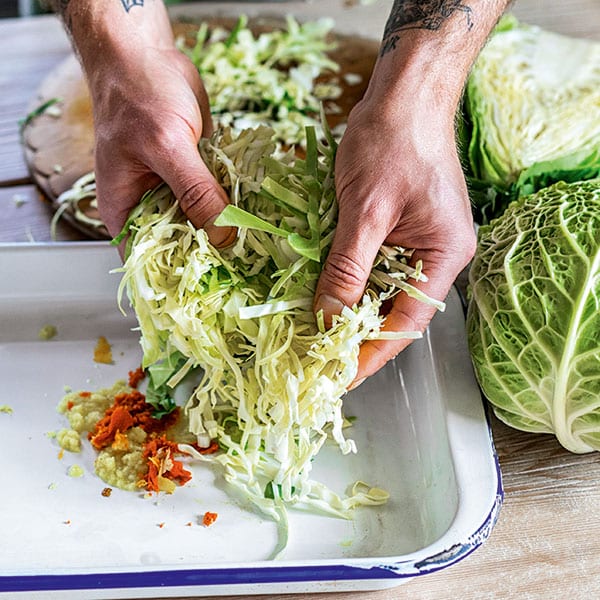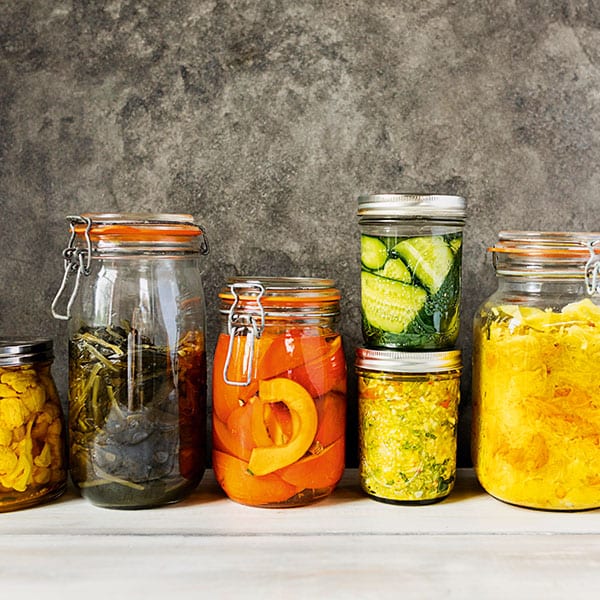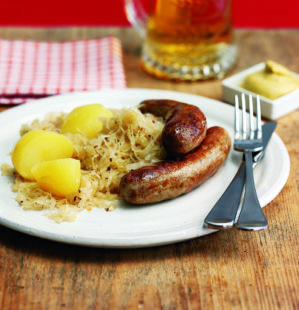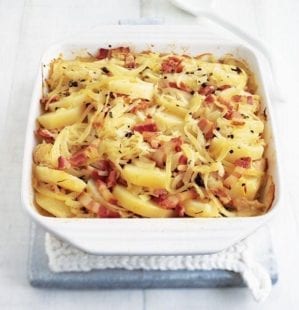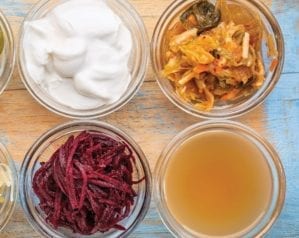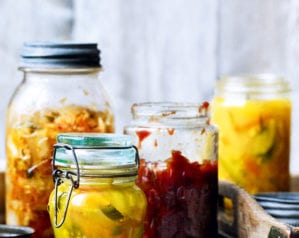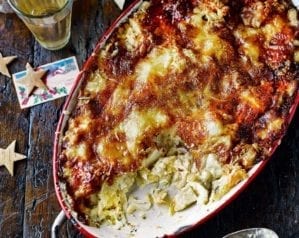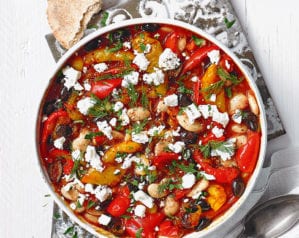
Golden sauerkraut
- Published: 9 Feb 21
- Updated: 18 Mar 24
If you’re keen to try your hand at the ancient art of fermenting, creating a jar or two of sauerkraut is a great place to start. James Strawbridge’s sunshine-bright, tangy kraut is full of flavour and has the additional upside of being good for your gut.
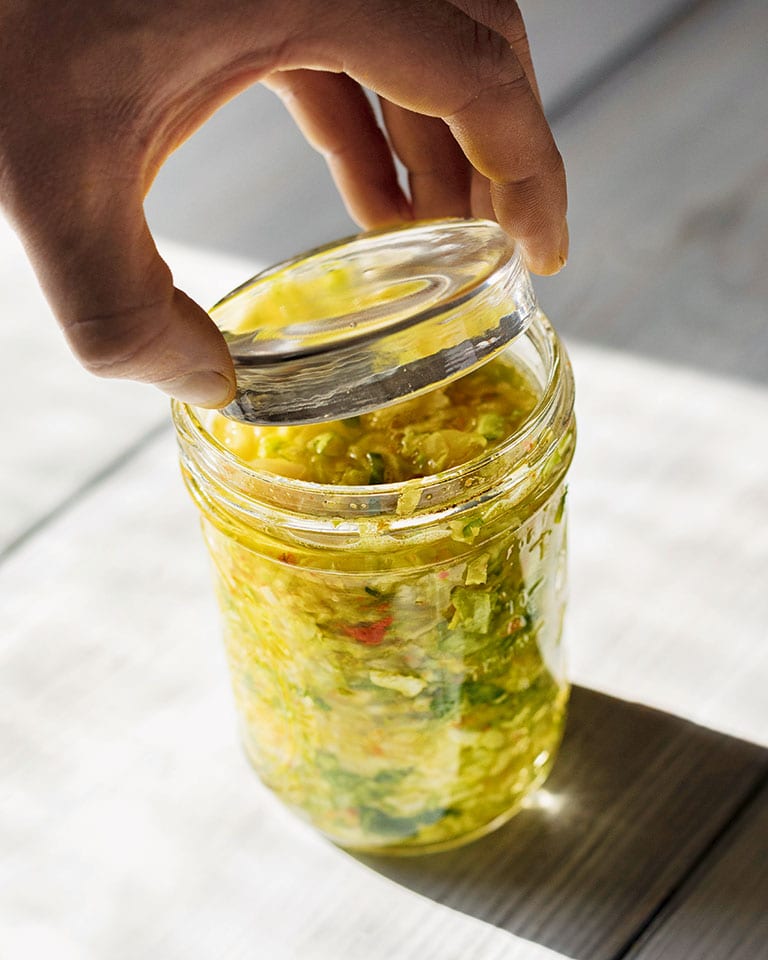
James says: “Sauerkraut has its roots in ancient Mongolia, but nowadays has a distinctive Germanic or Eastern European vibe. The method can be adapted for a host of vegetables from around the world; red cabbage, fennel, celeriac and carrot kraut are all worth trying. Fermentation needs careful observation – the vegetables must always be covered by the liquid so they don’t dry out or discolour.”
James Strawbridge is a Cornwall-based photographer, recipe developer and eco-living expert. He’s written several books (including The Artisan Kitchen) and been a regular on TV in shows such as The Hungry Sailors with his dad Dick and It’s Not Easy Being Green.
-
Makes 2 x 500ml jars
-
Hands-on time 30 min, plus overnight soaking and 10-14 days fermentation
Ingredients
- 1 whole cabbage, such as savoy, white, hispi, Chinese, kale or other brassicas (about 900g), very finely sliced – use a mandoline if you have one
- 1 tbsp grated garlic (optional)
- 1 tbsp grated fresh turmeric or 2 tsp ground turmeric
- Fine sea salt
You’ll also need
- 2 x 500ml preserving/fermentation jars (see Know-how)
- Pestle or rolling pin
Useful to have
- Mandoline
- Fermentation weights, sterilised (see Know-how)
Method
- Set a large mixing bowl or oven dish on a set of scales. Put the sliced cabbage into the bowl with the garlic (if using) and turmeric and weigh. Calculate 2 per cent of the total weight to find the amount of salt you need (total weight in grams ÷ 100 x 2 = the amount of salt in grams). Cover the veg evenly with the salt, then massage the cabbage with your hands to break down the cellulose.

- Lightly cover and leave at room temperature overnight. In the morning, use a pestle or rolling pin to ram the salted cabbage into the sterilised jars, ensuring you squeeze out air pockets and completely submerge the cabbage in its own brine. If necessary, press the cabbage beneath the surface of the liquid with fermentation weights (see James’s tips and Know-how).
- If using fermentation jars, open the valve. If using preserving jars, leave the lids loose enough to allow gases that build up while the kraut ferments to escape.
- Leave to ferment at room temperature (18-22°C or warmer for a fast ferment, cooler for a slower, more full-bodied ferment) for 10-14 days. Once fermented, seal, label and store until you want to serve (see Make Ahead)

- Recipe from February 2021 Issue
Nutrition
- Calories
- 9kcals
- Fat
- 0.1g (trace saturated)
- Protein
- 0.6g
- Carbohydrates
- 1g (1g sugars)
- Fibre
- 1g
- Salt
- 0.5g
delicious. tips
As an alternative to using fermentation weights, ensure the top layer of cabbage is covered with a small disc of baking paper that you push down underneath the brine.
To create an even more colourful kraut, add some peeled, thinly sliced or grated beetroot, which will stain the whole ferment purple (or yellow if you use golden beetroot). It’ll also provide an earthy, grounding note to the kraut. Aim to have 25 per cent beetroot in the mix – you’ll need about 225g for the 900g of cabbage in this recipe.
For extra flavour, add dried juniper berries, grated fresh ginger, caraway seeds or some chopped fresh dill.
You need to make the kraut and allow it to ferment for 10-14 days before you want to eat it. Store it in the fridge after this initial ferment to slow down the process – it will keep unopened in the fridge for up to 1 month. Once opened, keep chilled and use within a week.
If you plan to make fermented pickles regularly, fermentation weights, often made of glass, are useful – as are fermentation jars, which have a valve to let gases escape without adding air to your pickle. Buy both at lakeland.co.uk. And here’s our advice on how to sterilise jars.
Buy ingredients online
Rate & review
Rate
Reviews
Subscribe to our magazine
Food stories, skills and tested recipes, straight to your door... Enjoy 5 issues for just £5 with our special introductory offer.
Subscribe
Unleash your inner chef
Looking for inspiration? Receive the latest recipes with our newsletter
